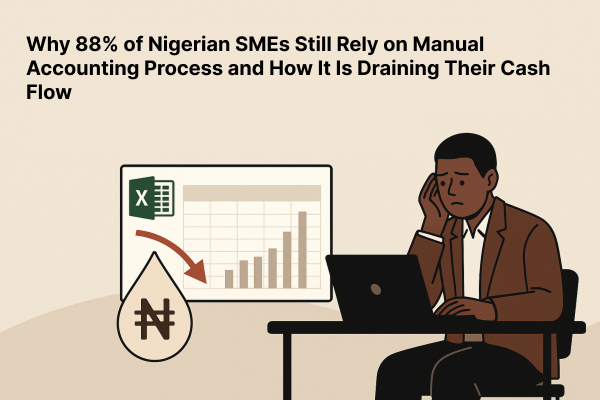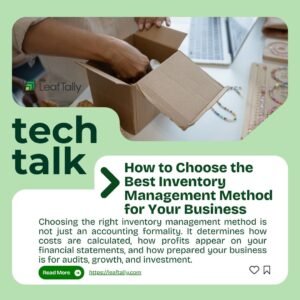Introduction: The Excel Epidemic in Nigeria’s SME Sector
Walk into any Nigerian small business, and chances are you’ll find one thing in common—Microsoft Excel. From shops and restaurants to freelancers and service providers, Excel remains the go-to tool for managing finances. Sounds harmless, right? But what if I told you that sticking to spreadsheets is quietly draining your business of time, money, and growth potential?
Let’s break down why 88 percent of Nigerian SMEs still rely on Excel and why that needs to change—fast.
Why Excel Became the Default Accounting Tool
Free, Familiar, and Easy to Start
Excel has always been free or cheap, and it comes bundled with most laptops. It’s also familiar—most business owners learned to use it in school or picked it up from friends. Starting your accounting journey with Excel just feels easy.
The Legacy of Manual Bookkeeping
Historically, Nigerian entrepreneurs have relied on notebooks and ledgers. Excel was simply a digital upgrade. It let you keep everything in one place—until things got complicated.
The Hidden Costs of Sticking to Excel
Time Wasted on Manual Calculations
You probably spend hours every week updating rows, dragging formulas, and fixing broken links in your spreadsheet. That’s time you could be spending finding new customers or improving your products.
Error-Prone Records and Costly Mistakes
Fat-fingered data, missed decimal points, or overwriting the wrong cell—Excel mistakes aren’t just embarrassing, they’re expensive. One wrong formula could mess up your payroll or understate your VAT.
Lack of Real-Time Visibility
Your numbers are only as fresh as your last update. Excel doesn’t sync with your bank account or track real-time expenses. So by the time you realize cash is running low, it’s often too late.
No Built-In Compliance or Automation
Excel can’t file your VAT returns. It won’t remind you about PAYE deadlines. It doesn’t auto-generate invoices. Everything has to be done manually, which increases stress and the chances of getting penalized.
Why Cash Flow Is the Lifeblood of SMEs
How Excel Breaks the Cash Flow Cycle
Cash flow is about knowing how much money is coming in, going out, and when. With Excel, tracking cash flow is guesswork. Most SMEs end up reacting too late to financial shortfalls instead of planning ahead.
Missed Invoices and Delayed Payments
Forget to follow up on an unpaid invoice? With no reminders or automation, Excel lets revenue slip through the cracks. That delay could mean you can’t pay staff or restock inventory on time.
What Modern Accounting Software Offers
Real-Time Dashboards and Reports
Online accounting software for Nigerian businesses like Leaftally shows your income, expenses, and cash position instantly. No waiting. No digging through tabs.
Automatic VAT and PAYE Calculations
Stop stressing about compliance. Leaftally handles local tax rules in the background. It even reminds you when payments are due.
Secure Cloud Access from Anywhere
Whether you’re at your desk or on the move, you can log in from your phone or laptop. No more emailing spreadsheets or risking file loss.
Why Leaftally Is Designed for Nigerian SMEs
Built for Naira, Built for Nigeria
Unlike global tools, Leaftally understands the Nigerian market. From Naira invoices to CBN-compliant reports, it speaks your business language.
A QuickBooks Alternative with Local Support
Looking for a QuickBooks alternative in Nigeria that won’t break the bank or leave you waiting on foreign customer support? Leaftally is your answer—affordable, local, and responsive.
Simple, Smart, and Scalable
Whether you’re just starting or scaling to multiple branches, Leaftally grows with you. It’s intuitive enough for beginners but powerful enough for experienced bookkeepers.
Switching from Excel to Leaftally: What It Takes
One-Click Import Tools
You don’t have to start over. Leaftally lets you import existing Excel data in minutes. No coding. No IT support. Just drag, drop, and go.
Free Invoice Generator and Payroll Setup
Need to create a Naira invoice or set up payroll? Leaftally includes built-in tools that do both—with automation baked in. Say goodbye to manual invoice templates.
Conclusion: It’s Time to Ditch the Spreadsheets
Excel has had a good run. But if you’re serious about growing your business, improving cash flow, and staying compliant, it’s time to move on.
Leaftally offers everything Nigerian SMEs need in one easy-to-use platform—automated accounting, local compliance, payroll tools, and smart cash flow tracking. Don’t let outdated spreadsheets limit your success. Make the switch today.
FAQs
What makes Leaftally better than Excel for Nigerian SMEs?
Leaftally automates your bookkeeping, calculates VAT and PAYE, generates invoices in Naira, and shows real-time cash flow—all things Excel can’t do.
Is Leaftally really a good QuickBooks alternative in Nigeria?
Absolutely. It’s built for Nigerian businesses, supports local currency and tax rules, and offers customer support tailored to your region.
Can I import my Excel spreadsheet into Leaftally?
Yes, Leaftally includes one-click import tools that let you upload your existing Excel data and start using the platform immediately.
Does Leaftally support invoice generation in Naira?
Yes. Leaftally features a built-in Naira invoice generator with customizable templates and automated reminders.
Is Leaftally suitable for small businesses just starting out?
Definitely. Whether you’re a one-person operation or a growing team, Leaftally is simple to set up, easy to use, and scales as your business grows.






